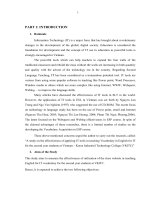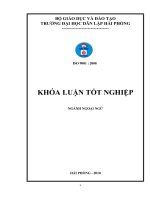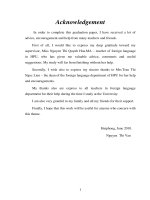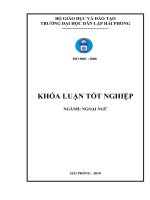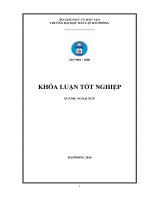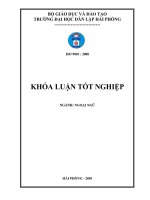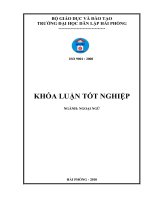A study on formation of adjectives from nouns in English
Bạn đang xem bản rút gọn của tài liệu. Xem và tải ngay bản đầy đủ của tài liệu tại đây (300.61 KB, 40 trang )
Acknowledgements
First of all, I would like to express my gratitude to Nguyen Thi Yen Thoa,
M.A my supervisor for her enthusiastic guidance, assistance and encouragement.
My sincere thanks go to all the teachers in English Department of Hai
Phong Private University for their endless enthusiastic, valuable teaching and
tremendous assistance.
Finally, I am very grateful to my family and all my friends who have
helped and given me many encouragements as well as supplied me with
materials during the time this graduation paper was done.
Hai Phong, June 2009.
Tran Thi Xoan
2
Part I
Introduction
1. Rationale
English is considered a global language, so it is taught widespread all over
the world. The aim of the learners is to have a good skill of communication in
English. In order to gain that aim, besides a good knowledge of grammar,
learners need to have a plentiful source of vocabulary. However, by what way
you learn by heart all the English words is always a question raised. Learners
have many difficulties in learning the vocabulary because of its formation, how
to use English words effectively in communication.
Adjectives occupy a large number in English vocabulary. It is also an
important factor to make a meaningful sentence.
Adjectives make up a very large group of words in the English vocabulary
(about 23%). Adjectives tell about the qualities and features of people, things, or
concepts (small, brave, elegant, intelligent) and can be viewed as an added
intensifier or ‚decoration" to the basic sentence elements, adding variety and
descriptive value.
In order to understand adjectives deeply, guess their meaning and use
them flexibly, learners have to know their formation. English adjectives are
formed from many resources in which formed from nouns is quite popular.
Thanks to this method, we not only enrich adjectives greatly but also guess their
meaning basing on the root nouns.
That is why I choose the subject ‚a study on adjective formation from
nouns‛ to discuss in my graduation paper and I hope that it will be useful for my
studying English now as well as in the future.
2. Aims of the study
As I mention above, adjective plays an important role in English sentences
so it is necessary to learn its formation. In this graduation paper, I would like to
investigate one of the methods forming English adjective that is ‚adjective
formation from nouns‛. I hope that my study will help English learners more
3
and more understand adjective formation from nouns. Therefore, the aims of my
study are:
- To introduce the general knowledge of adjective and noun.
- To investigate the way to form adjective from noun.
- To point out some implication of my study: related problems and
solutions in understanding and using adjectives formed from nouns.
3. Scope of the study
Although adjective and its formation is interesting subject, attracting my
attention, due to the limitation of time as well as knowledge, this study only
takes my investigation in one small part of adjective formation, that is ‚adjective
formation from nouns‛. In the study, I give analysis about the formation of
adjective from nouns, especially adjectives forming suffixes such as ‚-able‛, ‚-
ible‛, ‚-ful‛, ‚-y‛, ‚-ing‛… Moreover, I also give the implication of the study.
I hope that my study will give more clear understanding of adjective
formation for you and me.
4. Methods of the study
To complete my research, I try my best to collect essential related
documents in reference books with great help of my guide teacher.
Definitions, examples in my graduation paper are extracted from different
materials such as internet, dictionary, university grammar of English (Quick) and so
on.
Moreover, I have given some exercises basing on practical lesson.
5. Design of the study
With the aim to help learners get main ideas easily, I divide my study into
three main parts:
- Part I is the introduction that mentions the reason, the purpose, the
scope and the design of the study.
- Part II is entitled development consisting of three chapters:
+ Chapter 1: Theoretical Background, deals with the definition,
classification of word in English, nouns, adjectives and adjective formation.
4
+ Chapter 2: Formation of adjectives from nouns
+ Chapter 3: The implication
Some related problems and suggested solutions for learners of English in
learning adjective formation from nouns
- Part III is the conclusion, summarizing what have been discussed in the
previous parts.
5
Part II
Development
Chapter 1
Theoretical Background
1. Words in English
Definition
The factor establishing a phrase, a clause or a sentence is a word. So what
exactly do we mean by the term ‚word‛? The term ‚word‛ is used to designate an
intermediate structure smaller than a whole phrase and yet generally larger than a
single sound segment. Most fluent speakers of English seem to know what a word
is.
They know, for example, that words are listed in dictionary, that they may
be separated in writing by spaces and that they may be separated in speech by
pauses. However, the word may be defined differently depending on whether we
focus on its representation, the thought, which it expresses or purely formal
criteria. According to most linguistics, word, a basic unit is not easy to define.
Some linguistics refer to semantic; some refer to phonology…to define the word.
For instance, according to Free multilingual dictionary [http:// www.
thefreedictionary. com/ word], ‚a word is a unit of language that native
speakers can identify. Words are the blocks from which sentences are made‛.
In fact, a sentence maybe is made by many words or only a word.
Eg: I want to buy a new laptop.
The sentence above contains seven words. It means that each word is a block of
the sentence. However, only one word also makes a sentence.
Eg: Listen!
We can consider ‚listen‛ is an imperative sentence.
This sentence means to order or command somebody to ‚listen‛.
With a different view, Bloomfield, a linguistic defined word as a form that
can occur in isolation and having meaning but which can not be analyzed into
6
elements that all can occur alone and having meaning.
For practical purposes, we accept the definition of words: ‚A word is a
free form that can not be divided wholly into smaller free forms‛.
[ Doan Minh & Nguyen Thi Tuyet, 2001: 30]
On the other hand, there is another definition that is considered the most
satisfactory and close to the definition of Bloomfield, ‚a word is a dialectical
unit of form and content, independent unit of language to form a sentence by
itself‛
[Hoang Tat Truong, 1993: 10]
According to this definition, a word consists two parts: the form and
content. The content is expressed through its form and the form is used to
express its content. The word is independent and its function is to form phrase,
clause, and sentence. For example: ‚Della‛, ‚intelligent‛, ‚girl‛, ‚class‛, ect.
These words are independent units of language and they are able to make a
meaningful phrase or sentence like: ‚Della is the most intelligent girl in my
class‛.
Types of words
English words may be classified on the basic of the kinds and
combinations of morphemes of which they are composed. There are three main
kinds of words: simple words, derived words and compound words.
Simple words
Nguyen Hoa Lac, the writer of the book ‚An Outline of Morphology‛ said that:
‚a simple word consists of a single free form and a super fix with or without
any inflectional suffix‛.
Eg: girl, rose, bread, kitten, love, paradise, pink, violet, star, mother, sister,
car, life, pretty,etc.
1.2.2 Derived words
‚A derived word is a word which consists of a root and an affix (or several
affixes) and is produced by the process of word-building known as affixation
(or derivation)‛. Derived words are extremely numerous in the English
vocabulary.
7
[ Nguyen Manh Hung, MA. – Le Quoc Hanh, MA.]
Eg: polite - impolite - politeness
‚Impolite‛ = polite (root word) + ‚im‛ (the prefix) antonymous
‚Politeness‛ = polite (root word) + ‚-ness‛ (the suffix)
Happy - unhappy – happily
‚unhappy‛ = happy (root word) + ‚un‛ (the prefix) antonymous
‚happily‛ = happy (root word) + ‚-ly‛ (the suffix)
Compound words
Another widespread word structure is a compound word consisting of two more
stems with or without affixation morphemes. Words of this structural type are
produced by the word, compound process called composition.
Eg: school fee = school (root word) + fee (root word).
Kindhearted = kind (root word) + heart (root word) + ‚-ed‛ (the
suffix).
Furthermore, there is another frequent type of words. It is complex words.
Complex words contain at least one bound morpheme as an immediate
constituent and a superfix with or without an inflectional suffix. They fall into
two subclasses:
- Complex words with a bound stem, sometimes called primary
derivatives, are composed of two bound morphemes, one of which is a
base, and a superfix = an inflectional suffix. The second bound
morpheme may be a prefix, as in ‚conceive, disturb, prepare‛, or a
suffix, or in ‚missile, version, amity‛. These words may in turn have
inflectional suffixes, as in ‚disturbed, preparing, missiles‛.
- Complex words with a free stem, sometimes called secondary
derivatives, consist of a stem which is itself a word, a prefix or
derivational. The stem may be either a single free form, as in ‚love,
undo, hopeless‛ or a complex word with bound base, as in ‚receiver,
misconceive, fissionable‛
In short, there are three main kinds of words: simple words, derived words and
compound words. And my graduation paper will concentrate on studying derived
8
words (exactly derived adjectives). It is formed by adding suffixes to nouns.
Derived adjectives are extremely numerous in English vocabulary. Next, I would
like to refer to word formation.
2. Word formation
Definition
‚Word formation is the process of building new words from the material
already existing in the language according to certain structural and semantic
patterns and formulae‛.
(Basic English Lexicology, Hoang Tat Truong: 15)
This process will result in the production of a specific type of word.
Consequently, an understanding of this process is one way of studying different
types word that existing in English. In other word if we know how association of
different constituent morphemes makes complex lexical items, then we can also
analyze any complex word into its various constituent.
For example, if we know that ‚beautiful‛ and ‚golden‛ are made by the
addition of the suffixes ‚-ful‛ and ‚-en‛ to the nouns ‚beauty‛ and ‚gold‛, then
we can analyze any complex adjective inflected by any these suffixes into its
constituent parts. Similarly, we can also analyze any other complex parts of
speech.
There are eight basic processes of word formation: affixation, conversion,
compounding, shortening, sound imitation, back derivation, sound & stress
interchange and word from names.
However, the primary way to form adjective from noun is using affixation
(suffixes); I only want to deal with affixation.
2.2 Affixation
Affixation is the formation of new words with the help of affixes. Affixes
consist of prefixes and suffixes therefore affixation is derived into prefixation
and suffixation.
9
2.2.1 Prefixation
Prefixation is the process of building a new word by adding prefix.
Eg: supermarket, enrich, dislike, overtime, ect.
Commonly, prefix which is combination of the letters placed before a word,
or root word to change its meaning, rarely changes the part of speech of the root
words but there are some prefixes changing the part of speech and they are
called conversion prefixes such as: ‚en-‛, ‚a-‛, ‚be-‛, ‚up-‛, ect.
Basing on the meaning, prefixes can be classified into following types:
Negative prefixes: un-, a-, in-, non-, etc.
Reversal and privative prefixes: dis-, un-, de-, etc.
Prejorative prefixes: mis-, mal-, etc.
Location prefixes: over-, under-, sub-, inter-, etc.
Prefixes of degree & size: mini-, sub-, super-, ultra-, etc.
Prefixes of time & order: pre-, post-, re-, etc.
Prefixes of attitude: co-, pro-, anti-, etc.
Prefixes of number: mono-, bi-, poly-, etc.
In short, the meanings of the prefixes in English are very greatly & we
have to be vigilant when dealing with them. By learning the prefixes, you will
understand the meaning and the formation of words in English more clearly.
2.2.2 Suffixation
Suffixation is the formation of word by means of suffix. Suffixes usually
change the meaning of the roots or stem both semantically and grammatically.
Its purpose is either to form a new word or to show the function of word. For
example: ‚danger‛ is a noun but ‚dangerous‛ is an adjective. On the other
hand, ‚study‛ is a verb, but ‚student‛ is a noun.
Like prefixes, suffixes can also be classified in different ways according
to different principles such as part of speech, productive degree, and origin.
However, the most practical principle is the part of speech. Within this
scope, suffixes consist of the following types:
Suffixes forming noun: -er, -or, -ing, -tion, -ness, -ist, etc.
Suffixes forming adjective: -able, -ed, -y, -ful, etc.
10
Suffixes forming verb: -ize, -en, etc.
Suffixes forming adverb: -ly, -wise, etc.
By learning suffixes, we can know the meaning of the new words and recognize
the function of the new words.
In conclusion, affixation is a process whereby new words can be formed
by adding elements either to the front or the back of the word. This is the most
productive process to form adjective from nouns.
3. Nouns in English
Definition
Noun is a word indicating a person, animal, place, thing and abstract idea.
A noun can function in a sentence as a subject, a direct object, an indirect
object, a subject complement, an object complement, an adjective or an adverb.
Classification
There are many different types of nouns. Grammarians have developed a
whole series of noun types including the proper nouns, the common nouns, the
concrete nouns, the abstract nouns and the collective nouns.
3.2.1 Proper nouns
Proper nouns are nouns representing unique entities, personal names,
geographical names, names of organizations and institutions like: London,
Vietnam, BBC, Christmas, etc.
3.2.2 Common nouns
Common nouns are nouns referring to a person, place or thing in general
sense.
Eg: summer, people, worker, etc.
3.2.3 Concrete nouns
Concrete nouns are nouns which refer to definite objects which you use at
least one of your senses to observe.
Eg: dog, cat, picture, etc.
3.2.4 Abstract nouns
On other hand, abstract nouns refer to ideas or concepts that you can not
11
perceive through your five senses.
Eg: love, happiness, beauty, etc.
3.2.5 Collective nouns:
Collective nouns are nouns that refer to groups consisting of more than
one individual or entity, even when they are inflected for the singular.
Eg: army, family, staff, troop, etc.
4. Adjectives in English
Definition
Adjective is one of open- class items that refers to characterize of thing or
person to modify about: shape, color, quality…
Adjectives describe or modify nouns. Adjectives tell the reader more
about the noun used in the sentence.
Eg: nice, handsome, good, etc.
Classification
Adjectives can be sub classified according to syntactic functions and
semantic functions.
Syntactic sub-classification of adjectives.
Adjectives can be sub classified according to whether they can function
variously in the following cases:
Firstly, they function as both attribute & predicative.
Eg: a hungry man
The man is hungry.
Secondly, they function as attribute only:
Eg: my old(1) friend
My friend is old (2).
‚Old‛ (1) refers to the friendship and does not characterize the person.
‚Old‛ (2) refers to the character of a person.
Finally, they function as predicative only:
Eg: The woman is loath to admit it. (1)
A loath woman (2)
12
‚Loath‛ in (1) is different from ‚loath‛ in (2).
He is afraid to do it. = He fears to do it.
Semantic sub-classification of adjectives
4.2.2.1 Stative and dynamic adjectives
Adjectives are characteristically stative, but many can be seen as dynamic.
Stative adjectives are often used to indicate the stable notion or status.
Eg: She is beautiful.
Dynamic adjectives are often used to indicate a changing situation/
characteristics.
Eg: She is getting more and more beautiful.
4.2.2.2 Gradable and non-gradable adjectives
Most adjectives are gradable. Gradability includes comparison:
tall taller tallest
handsome more handsome most handsome
and other forms of intensification:
very young so pain extremely useful
All the dynamic adjectives are gradable.
Some are non- gradable, principally ‘technical adjective’ like atomic (scientist)
and hydrochloric (acid) and adjectives denoting provenance like British.
4.2.2.3 Inherent and non-inherent adjectives
Adjectives that characterize the reference of the noun directly are termed
inherent, those that do not are termed non- inherent.
Some non- inherent adjectives occur also predicatively. For example, both a new
student and a new friend are non- inherent.
Eg: He is a big fool.
(Non- inherent)
It is a big cat.
(Inherent)
In conclusion, adjectives make up a very large group of words in the
English vocabulary. Searching the adjective formation, especially adjective
formation from nouns is very important for learners who love English to improve
13
their adjective vocabulary. Moreover, learners can enrich their vocabulary as
well as have a clearer view on English vocabulary.
14
Chapter 2
Formation of adjective from nouns
There are many suffixes used to form adjective such as: ‚-tive‛, ‚-ory‛,
‚ose‛,etc. However, my graduation paper only focuses on adjective forming
suffixes from nouns such as: -ful, -ish, -less, -ly, -y, e.g. successful; childish,
foolish; priceless, nameless; cowardly, friendly; smoky, bloody.
-ly can be added to father, mother, brother, sister, daughter, man, woman.
-y can be added to cream, rain, sun, wind, winter, sand, hill, hair, water.
They are called denominal suffixes.
There are some adjective forming suffixes from nouns that i will study as
follow:
1. Suffixes “-ful” and “-less”
‚-ful‛ and ‚-less‛ are two productive suffixes to form adjective from
nouns. They are English suffixes. We often add the suffixes ‚-ful‛ and ‚-less‛ to
nouns (chiefly abstract nouns) to form gradable adjectives. Suffix ‚-less‛ is
antonym of suffix ‚-ful‛.
Eg:
lawful lawless
meaningful meaningless
graceful graceless
We have two opposite adjectives by adding the suffixes ‚-ful‛ and ‚-
less‛ to the same base noun.
Use - useful
useless
change - changeful
changeless
color - colorful
colorless
The meaning of adjective forming suffixes ‚-ful‛ and ‚-less‛ from
nouns is related to the meaning of the original noun.
15
The meaning of suffix ‚-ful‛ is either ‚having…‛ or ‚giving…‛
Eg:
This tool has many uses. (1)
This machine is very useful. It makes doing this task a lot easier.
(2)
[http: // en. wikipedia. org]
The word ‚use‛ in (1) is a noun that means ‚a function, a purpose for
which something may be employed‛. When the word ‚use‛ is added suffix
‚ful‛, it becomes an adjective as in (2). The meaning of adjective ‚useful‛ in (2)
is still related to the meaning of the noun ‚use‛. Truthfully, ‚useful‛ means
‚having a practical or beneficial use‛. Therefore, we can rewrite (2) by using
the noun ‚use‛ as:
This machine has a lot of uses.
Let us consider other examples:
I need some help with my homework. (3)
He is very helpful. (4)
Her natural beauty makes me admired. (5)
She is a beautiful girl. (6)
‚Help‛ in (3) is a noun whose meaning is ‚an action given to provide
assistance, aid‛. ‚Helpful‛ in (4) is an adjective derived from noun ‚help‛ by
adding suffix ‚-ful‛ to the noun ‚help‛ and of course, the meaning of ‚helpful‛
has close relation with the meaning of noun ‚help‛ in (3). (4) can also be
understood as: ‚He has given another people a lot of help.‛
The meaning of the base noun ‚beauty‛ is ‚a particular grace, feature,
ornament, or excellence; anything beautiful; as, the beauties of nature‛.
[1913 Webster]
In addition, the meaning of the derived adjective ‚beautiful‛ is ‚having the
qualities which constitute beauty; pleasing to the sight or the mind‛.
[1913 Webster]
However, the meaning of suffix ‚-less‛ is ‚without…‛
16
Eg: useless: without use or possibility to be used
lawless: not governed by any law
careless: not concerned or worried about
Let us consider these sentences:
He needs no indirect nor lawless course. (1)
Mary often gives to me the useless gift. (2)
My brother was too careless of his charge. (3)
In (1) we use the derived adjective ‚lawless‛ instead of the phrase ‚Contrary to,
or unauthorized by, law; illegal; as, a lawless claim‛. This usage makes the
sentence richer about the expression.
In (2) and (3) we have the similar explaination. The derived adjective ‚useless‛
is used instead of the phrase ‚having, or being of, no use; unserviceable;
producing no good end; answering no valuable purpose; not advancing the
end proposed; unprofitable; ineffectual‛. And the derived adjective ‚careless‛
is also used instead of the phare ‚having no care; not taking ordinary or proper
care; negligent; unconcerned; heedless; inattentive; unmindful; regardless‛.
To form adjective from nouns by using the suffixes ‚-ful‛ and ‚-less‛,
there are not much any spelling transformations, except for nouns ending in ‚y‛.
We only need add these suffixes following nouns.
Eg: lawful = law + ful
lawless = law + less
meaningful = meaning + ful
meaningless = meaning + less
graceful = grace + ful
graceless = grace + less
Nouns ending in ‚y‛ have a little change.
‚y‛ changes ‚i‛ before the ending ‚-ful‛ if the noun ends in a consonant + ‚y‛.
Eg: beauty - beautiful
pity - pitiful
‚y‛ does not change if the noun ends in a vowel + ‚y‛.
Eg: joy - joyful
17
2. Suffixes “-able” and “-ible”
‚-able‛ and ‚-ible‛ are also two productive suffixes to form
adjective. They are Latin suffixes.
Eg: love - lovable
like - likable
charity - charitable
sense - sensible
access - accessible
The meaning of adjective forming suffixes ‚-able‛ and ‚-ible‛ from
nouns are related to the meaning of the original noun.
They mean ‚capable ‛ or ‚worthing…‛
Eg: Love conquers all. (1)
Kitty is a lovable animal. (2)
John is standing near the access. (3)
The White House is accessible to every American citizen. (4)
‚Lovable‛ in (2) means ‚inspiring love‛, it has close relation with the
meaning of the noun ‚love‛ in (1) which means ‚a variety of different feelings,
states, and attitudes, ranging from generic pleasure ("I loved that meal") to
intense interpersonal attraction ("I love my boyfriend")‛.
The derived word ‚accessible‛ in (4) is formed by adding suffix ‚-ible‛ to
the base noun ‚access‛ in (3).
‚Accessible‛ in (4) can be viewed as the "ability to access" the
functionality, and possible benefit, of some system or entity. Its meaning is close
to the meaning of the noun ‚access‛ (a way of entering or leaving).
3. Suffix “-y”
Suffix ‚-y‛ is one of English suffixes
Suffix ‚-y‛ is one of English suffixes. It is also a productive suffix to form
adjective. Suffix ‚-y‛ is added to nouns (chiefly concrete nouns) to form
adjectives.
Eg: juice - juicy
ink - inky
18
bush - bushy
rose - rosy
wind - windy
rain - rainy
cloud - cloudy
The meaning of suffix ‚-y‛ is either ‚having…‛, ‚like…‛ or ‚covered
with…‛
Eg:
I like a cream. (1)
She has a cream skin. (2)
Tom has a short black hair. (3)
She does not like his hairy face. (4)
I want a little wind. It is too hot today. (5)
It is windy today. (6)
‚A creamy skin‛ is a skin like ‚cream‛. The meaning of adjective ‚creamy‛ in
(2) is related to the meaning of noun ‚cream‛ in (1). The word ‚cream‛ is also
in terms of color. Let us consider the sentence number two, ‚She has a cream
skin‛, it means that her skin is like cream.
In (4), ‚a hairy face‛ means a face covered with ‚hair‛. Adjective ‚hairy‛ in (4)
is formed by adding suffix ‚-y‛ to the noun ‚hair‛ in (3). It means that the
meaning of adjective ‚hairy‛ is close related to the meaning of noun ‚hair‛.
‚Hair‛ is a covering for the body (or parts of it) consisting of a dense growth of
threadlike structures (as on the human head); helps to prevent heat loss. And
‚hairy‛ means having or covered with hair.
Let us consider examples (5) & (6).
‚It is windy today‛ means ‚it has wind today‛. ‚Wind‛ is a flow of air or air
moving (sometimes with considerable force) from an area of high pressure to an
area of low pressure. After being added suffix ‚y‛, the noun ‚wind‛ becomes the
derived adjective ‚windy‛. It resembles the wind in speed, force, or variability.
To form adjective from nouns by using the suffix ‚-y‛, we often add
suffix ‚-y‛ after base nouns without any spelling transformation, eg:
19
ink = ink + y
silk = silk + y
except for nouns ending in ‚e‛. They are omitted before adding suffix ‚-y‛.
Eg: juice - juicy
rose - rosy
smoke - smoky
4. Suffix “-al” (also “-ial”, “-ical”)
Suffix ‚-ial‛ is used to form primarily non- gradable adjectives. It is a
Latin suffix. Suffix ‚-ial‛ is used to form primarily non- gradable adjectives. It is
a Latin suffix.
Eg: music - musical
classic - classical
crime - criminal
nation - national
nature - natural
editor - editorial
The meaning of suffix ‚-al‛ is ‚pertaining to…‛
Eg: Music makes my life more interesting. (1)
It sounds terrible. It is not musical. (2)
Societies define crime as the breach of one or more rules or laws
for which some governing authority or force may ultimately prescribe a
punishment. (3)
Hitler is considered as a criminal man on my point of view. (4)
The noun ‚music‛ in (1) means one kind of entertainment helping people relax.
After adding suffix ‚-al‛, the noun ‚music‛ becomes an adjective ‚musical‛. Its
meaning is closed to the meaning of the noun ‚music‛. The word ‚musical‛ in
(2) has a meaning pertaining to music. Its meaning is characterized by or capable
of producing music.
In the examples (3) and (4), we also can realize that there is an example of
adjective forming from noun. The noun ‚crime‛ in (3) plays the role of the
derived adjective ‚criminal‛ after being added the suffix ‚al‛. The noun ‚crime‛
20
means ‚an act punishable by law; usually considers an evil act‛. Besides that,
the adjective ‚criminal‛ means ‚involving or being or having the nature of a
crime‛.
5. Suffix “-ly”
Suffix ‚-ly‛ is added to nouns (chiefly abstract nouns) to form gradable
adjectives. It is unpopular way to form adjective from nouns. There is not many
word built by this way. Suffix “-ly” can be added to ‚father, mother, brother,
sister, daughter, man, woman…‛
Eg: friendly
manly
lively
elderly
lonely
silly
lovely
cowardly
The meaning of the suffix ‚-ly‛ is either ‚having the quality of…‛,
‚expressing liking…‛ or ‚having the character of…‛
Eg: ‚cowardly‛: having the quality of ‚coward‛
‚friendly‛: expressing liking ‚friend‛
‚manly‛: having the character of ‚man‛
Let us consider these examples:
I love my mother. (1)
Lollipop seems motherly with the children although she is not her mother.
(2)
[Vdict. Com]
According to ‚Vdict.com‛, the adjective ‚motherly‛ means ‚befitting a
mother; warm and nurturing, having characteristic of a mother‛. While the
meaning of the noun ‚mother‛ is ‚a woman who has given birth to a child
(also used as a term of address to your mother)‛. Therefore, we can see that the
meaning of the derived adjective ‚motherly‛ in (2) has close related to the
21
meaning of the base noun ‚mother‛.
6. Suffix “-ish”
Suffix ‚-ish‛ is a productive suffix to form adjective. It is added to
nouns (chiefly proper and countable nouns) to form adjectives non- gradable and
gradable adjectives.
Eg: girlish
childish
selfish
foolish
Turkish
The meaning of suffix ‚-ish‛ is either ‚somewhat…‛, ‚belong to…‛ or
‚having character of…‛
Eg: ‚youngish‛ : somewhat ‚young‛
‚Turkish‛ : belong to ‚Turk‛
‚foolish‛ : having character of ‚fool‛
Let us consider these sentences:
Tommy is just angry with me, that means he shows his true self. (1)
She is so selfish that she does not want to share anything with her sister. (2)
His hair turned white. (3)
Teacher asked something whitish but I do not know what exact is. (4)
The noun ‚self‛ in the first sentence means individuality, personality, or essence
It is the base root word to form a new derived adjective by adding the suffix ‚-
ish‛. The adjective ‚selfish‛ in the second sentence means ‚concerned chiefly or
only with yourself and your advantage to the exclusion of others‛.
In the forth sentence, the derived adjective ‚whitish‛ is also formed by the way
adding suffix ‚-ish‛ to the noun ‚white‛. Its meaning is close relation to the
meaning of the noun ‚white‛. ‚White‛ is a color, the perception which is evoked
by light that stimulates all three types of color sensitive cone cells in the human
eye in nearly equal amount and with high brightness compared to the
surroundings. In addition, ‚whitish‛ means ‚of something is having a color
tending toward white‛.
22
7. Suffixes “-ese” and “-ian”, “ous”
Suffixes ‚-ese‛ and ‚-ian‛, ‚ous‛ are three non- productive suffixes
to form adjective. The suffix ‚-ese‛ is Romanic suffixes. The suffix ‚-ous‛ may
come from Latin.
Suffixes ‚-ese‛ and ‚-ian‛ are added to noun (chiefly proper names, geographical
names, well-know personal names) to form non- gradable adjectives, however
suffix ‚-ous‛ is added to noun to form primarily gradable adjectives.
The meaning of these suffixes ‚-ian‛ and ‚-ous‛ is ‚pertaining
to…‛, but the meaning of suffix ‚ese‛ is ‚nationality…‛.
Eg: Chinese
republican
Darwinian
virtuous
courteous
vivacious
adventurous
courageous
The derived adjective ‚chinese‛ means ‚nationality of China‛.
The noun ‚republic‛ means ‚state in which supreme power is held by people or
their elected representatives or by an elected nominated president, not by a
monarch.‛
After being added suffix ‚ian‛, the noun ‚republic‛ becomes the adjective
‚republican‛. Its meaning has close relation with noun ‚republic‛, it means ‚of,
or constituted as a republic‛.
republican (a) = republic (n) + ‚an‛
The derived adjective ‚adventurous‛ means ‚characterized by the desire to seek
new experiences or risks‛.
adventurous (a) = adventure (n) + ‚-ous‛
The derived adjective ‚courageous‛ means ‚characterized by courage, brave‛.
courageous (a) = courage (n) + ‚ous‛
23
8. Suffix “-en”
Suffix ‚-en‛ is a popular suffix to form adjective from nouns.
It is often added to the nouns that refer to material such as: silk, wood, lead, etc
to form adjective.
Its meaning is ‚having the quality of…, material‛.
Eg: wooden
silken
leaden
woollen
golden
‚Silken‛: of or pertaining to silk; made of, or resembling, silk; as, silken cloth; a
silken veil.
[1913 Webster]
Silken (a) = Silk (n) + ‚-en‛
‚Golden‛: Made of gold; consisting of gold. Having the color of gold; as, the
golden grain.
[1913 Webster]
golden (a) = gold (n) + ‚-en‛
‚Leaden‛: Made of lead; of the nature of lead; as, a leaden ball.
[1913 Webster]
leaden (a) = lead (n) + ‚-en‛
‚Wooden‛: Made or consisting of wood; pertaining to, or resembling, wood; as,
a wooden box; a wooden leg; a wooden wedding.
[1913 Webster]
In short, each derived adjective was produced variously from nouns by
adding suffixes. Let us take a brief look at the suffixes meaning summary in
appendix to understand more clearly about the meaning of each derived adjective
with each suffix.
24
Chapter 3
IMPLICATION
Some related problems and suggested
solutions for learners of English in
learning adjective formation from nouns
It is said that forming adjective from nouns is a useful way in enriching
the learner’s source of adjectives. Thanks to this process, learners are easy to
catch the meaning of adjectives in the context although they meet the adjectives
at the first time. However, when studying this subject, learners discover that
besides benefits there are also some problems in the process.
1. Findings of the study
As we mention in chapter 2, English adjectives are formed from nouns through
the primary way using suffixes such as ‚-al‛, ‚-ish‛, ‚-ly‛…
With the suffixes, learners are easy to recognize adjectives. Ending such as ‚ful,
less, al, ish…‛ usually designate adjectives.
Eg: angry, beautiful, painful, zealous, etc.
With the suffixes, learners will be also easy to catch the meaning of adjective
suffixes. We can do like that, because meaning of derived adjectives is usually
related to meaning of the root nouns. For example, one of range of meanings
suffix ‚-less‛ is ‚without…‛, so we can guess the meaning of the adjectives
derived from nouns by adding suffix ‚-less‛ at the end like ‚childless‛,
‚lawless‛, etc basing on meaning of nouns ‚child‛ and ‚law‛.
Moreover, learners can enrich expression in English by using derived adjectives.
For example, we use the derived adjective ‚summitless‛ instead of using the
phrase ‚having no summit‛ or ‚beautiful‛ instead of ‚having the qualities which
constitute beauty; pleasing to the sight or the mind‛.
25
2. Possible problems and suggested solutions
2.1 Possible problems
It is said that the different nouns combine with different suffixes to form
adjectives So, by what way we can remember what is the correct suffixes for
nouns to form adjectives. It is very difficult to give a detail regular. There are
some troubles as follow:
The adjective ending ‚-al‛ should be confused with the noun ending ‚-al‛.
For instance, the word ‚natural‛ is a derived adjective forming from noun
‚nature‛. It means: ‚Conformed to the order, laws, or actual facts, of nature;
consonant to the methods of nature; according to the stated course of things,
or in accordance with the laws which govern events, feelings, etc.; not
exceptional or violent; legitimate; normal; regular; as, the natural
consequence of crime; a natural death; anger is a natural response to insult‛.
[1913 Webster]
What can be more natural than the circumstances in the behavior of those
women who had lost their husbands on this fatal day? Addison.
natural (a) = nature (n) + ‚-al‛
The word ‚arrival‛ is also ending in ‚al‛; however, it is a noun. ‚Arrival‛
means: ‚The act of arriving, or coming; the act of reaching a place from a
distance, whether by water (as in its original sense) or by land‛.
[1913 Webster]
‚The person or thing arriving or which has arrived; as, news brought by the
last arrival.
Another arrival still more important was speedily announced. Macaulay‛.
[1913 Webster]
arrival (n) = arrive (v) + ‚al‛
It is clear that with the same suffix ending, two words belong to two
different kind of word. One is a noun other is an adjective.
The question is that how to realize them. Perhaps, the best choice is practice and
practice. By the way learning by heart the meaning as well as the formation of
the word, you can solve this problem. Some examples of words using ‚-al‛ as an

